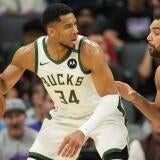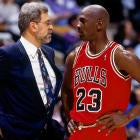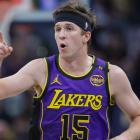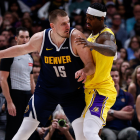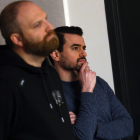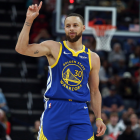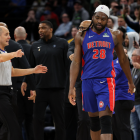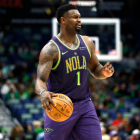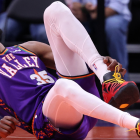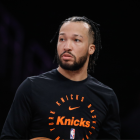In the final episode of "The Last Dance," the 10-part ESPN/Netflix documentary, Michael Jordan says he still can't accept that the Chicago Bulls didn't run it back for the 1998-99 season. He says it is "maddening" that the Bulls broke up after their second three-peat, and they could have won four straight.
Jordan says he would've signed another one-year contract back then, and both Phil Jackson and Dennis Rodman would have, too. He concedes that Scottie Pippen would've required some convincing -- um, yeah, Pippen demanded a trade mere months earlier -- but believes that, had the others committed first, the appeal of competing for a seventh title would have been too much to pass up.
This follows Jackson and Jerry Reinsdorf confirming that, despite public proclamations that 1997-98 would be the end of Chicago's run, the owner offered the coach another one-year contract. Jackson turned it down.
Reinsdorf explains that it would've been "suicidal" to bring back Pippen, Rodman, Steve Kerr and Ron Harper, from a financial perspective. Jordan watched this incredulously on an iPad, not buying any of it.
All Jackson offers on the subject is that it was "a good time to go." If Pippen, Rodman or any of the other Bulls provided different perspectives, the footage did not make it into the film.
Here's what "The Last Dance" doesn't tell you about the end of the era:
'Here's what happened: Jordan burned out'
"The Last Dance" does a superb job of capturing how drained Jordan was by the end of the 1998 Finals. Chicago barely made it through a seven-game series against the Indiana Pacers, and, just before Game 6 against the Utah Jazz, Jackson asked Jordan if he could play all 48 minutes. "Whatever it takes," replied Jordan, who ended up playing 44 and shouldering an enormous load.
Jordan's unforgettable shot over Bryon Russell gave him 45 of the Bulls' 87 points. A hobbled Pippen gutted through 26 minutes with a back injury, Harper hardly slept the night before because of a stomach illness and, aside from Toni Kukoc, the Bulls' role players contributed next to nothing in the scoring column.
The documentary shows Jordan looking completely wrecked on the bench during the timeout after his legendary shot. "Tired as hell," he remembers, narrating the scene. "I'm exhausted. But I have one more stop." Pippen approaches him with a few words, and the superstar briefly looks up, nods his head and and says nothing. Narrator Jordan explains that he is trying to muster up the energy to finish it off.
This is effective in showing the viewer just how difficult it was to win that last ring. The mental and physical exhaustion, however, are never connected to the breakup of the team the way they are in longtime Jordan chronicler Sam Smith's 2004 column for ESPN:
Here's what happened: Jordan burned out.
Perhaps he may not remember it that way, but both after that posed winning shot against the Utah Jazz in 1998 -- and there was a reason for that pose -- Jordan was telling confidants he would never play again.
Yes, it's why he did pose. He knew that was the last shot, and that's the way people talked about it then.
He couldn't stand playing with Scottie Pippen anymore. He was furious at Pippen for again missing a final game of the playoffs, as with the migrane episode of 1990. He was sick of all the injuries, still upset Pippen elected to have surgery just as training camp was to begin and wouldn't rejoin the team until midseason, sticking Jordan with Dennis Rodman. He was sick of Luc Longley and all the dropped passes.
He was also sick of babying Rodman. Jordan ran into Rodman recently and they talked at length. Later, Jordan confided to a friend he was amazed you could talk to Rodman. Back then, Jordan never did. I remember him saying when he had to talk to Rodman he'd grab him by the temples, plead for Rodman to look him in the eye and then tell Rodman what to do. Jordan said it was how he talked to his eight year old.
Smith wrote that Jordan "felt he had to carry too much burden," and that he "had been even having trouble sleeping at all that season and was considering medical help as a result." This jibes with what assistant coach Tex Winter said at the time, via the Chicago Sun-Times' Lacy J. Banks:
Watching Michael Jordan every day in practice gave Winter an even stronger indication that this season may have been the last.
"It's beginning to become real drudgery for him," Winter said. "It's not as much fun as it used to be. And that's one of the things that really worry me.
"Don't get me wrong. He's still the best player in the game. But all this is taking its toll on him. He's always been a guy who loves to get out on that floor and play hard and he still does. But it's harder and harder for him to do so."
Jackson told Newsweek that he couldn't imagine Jordan coming back. Earlier, Jordan himself had acknowledged that he had stopped working out for about three and the half weeks during the regular season in an as-told-to story for ESPN The Magazine with Rick Telander.
In Roland Lazenby's "Blood on the Horns," Bulls trainer Chip Schaefer said that Jordan's vibe was reminiscent of the season leading up to his first retirement.
"I see him being awfully close in similarity to the way he was when he left the game the first time in 1993," Schaefer told Lazenby. "In the early '90s, he would talk. We would have moments where we were alone while I was treating an injury of his, and he would speak of his frustrations. He would say, 'I don't think I can take this much longer.' I always thought he was just sort of venting. l was shocked when he retired the first time. But there are some things that are similar to that now. You can see the intrusions onto what he likes to do. Just a look of weariness on his face sometimes that he didn't have two years ago, or even last year."
Jordan was injured
On Jan. 13, 1999, a week after the NBA and the players association reached an agreement to end the lockout that resulted in a 50-game season, Jordan announced that he was retiring. "Mentally, I'm exhausted," he told reporters. "I don't feel like I have a challenge. Physically, I feel great."
That was not entirely true. He had cut his right index finger trimming a cigar while on vacation in the Bahamas. Jerry Krause brings this up in his unpublished, unfinished memoir, excerpts of which have been published by NBC Sports' K.C. Johnson over the last few weeks:
It was seriously questionable if he could regain enough movement in the finger to be himself again as a shooter. He could have easily put us in an extremely tough situation by saying he wanted to play and force us to sign him to the biggest contract in team sports history. It would then have been easy to go on the disabled list with the finger injury and spend the rest of that [lockout]-shortened season picking up checks every two weeks and not playing at all. But Michael being Michael, once he signed a contract, he gave you a thousand percent effort and would not think of stiffing you.
Jordan claimed that he had decided to retire before the injury. Maybe he never goes on that vacation and thus never suffers the injury if other factors were different. Still, it's worth mentioning, especially because the effects lingered when he became a Wizard.
From "When Nothing Else Matters," Michael Leahy's book on the Washington comeback:
A doctor in a local emergency room treated the injury, but the tendon was snapped, with the result that Jordan had a finger he could not move. Once back in Chicago, he went to John Hefferon, who, during surgery, also saw extensive ligament damage in the finger unrelated to the accident, the product of years of dislocations. Even in repairing the tendon, he couldn't hope to restore all of the finger's mobility and dexterity, he told Jordan. The finger would never again be able to handle a basketball with quite the same sureness. The rest of his right hand would need to compensate.
It never wholly adjusted, Collins knew. Before the accident, Collins had watched Jordan do anything with a basketball in his right hand -- palm it, grip it like a grapefruit, wave it at a foe before blowing by him and dunking. Now Collins saw that Jordan couldn't reliably palm the ball, making many dunks problematic. Most seriously, he experienced problems for the first time in handling the ball against defensive pressure, especially late in games, when defenders often came at him in double-teaming pincers. The index finger would sometimes betray him, and the ball would come up too high off the dribble, leaving him exposed and vulnerable to a steal. He'd occasionally dribble a ball off his foot, or try to make a stylish move and have the ball squirt away from him.
The Bulls might not have had much left
The conventional wisdom is that Bulls management did something wholly irrational, breaking up one of the best teams of all-time before it had been beaten. Jordan was still Jordan, and, not only were they champions, they had gone 62-20 with the ninth-best offense and third-best defense in the league despite Pippen missing almost half the regular season.
There is no guarantee, however, that Chicago would have been able to keep it up. In retrospect, perhaps making it through 1997-98 was miraculous. Think about all of the drama depicted in "The Last Dance," from Pippen delaying his surgery to Rodman skipping a Finals practice so he could hobnob with Hulk Hogan on "WCW Monday Nitro." Before the season, John Paxson, then a team broadcaster, prophetically told the Bulls that it would be infinitely more difficult to maintain than their last go-round, according to David Halberstam's "Playing For Keeps," as motivation and concentration would become challenging.
Pippen and Harper used to go to Jordan's house for morning workouts, but "breakfast club" ended that season. Rodman had his infamous Vegas vacation. And then there is this, from Jackson as told to Telander, published on ESPN in a series of diary entries:
Sometimes in a film session, I get upset and wonder what we're doing, why we can't put it together consistently. The other day, I stopped the film after watching Luc Longley screw up again, and I just said, "Everybody makes mistakes. And I made one coming back here with this team this year." I meant it in sort of a lighthearted way. But then Michael says, "Me too." So it weighed pretty heavy on everyone.
Later on in the session, Luc says, kind of to everyone, in the dark, "It's easy to criticize." He was hurt. Then Tex Winter jumped in and said, "Luc, I don't understand you. You don't have the right attitude." A shrug is a big deal for Luc; he is a lovable guy. But he says to Tex, "I wasn't talking about the coaching staff. Michael is the one being critical. I just want to let him know it's easy to criticize." And then Michael says, "The only thing that upsets me is when we lose. I think you should resolve to make yourself better the next time. Change."
The room was charged. It was somber. Michael was somber. He doesn't play cards with the guys like he used to. He is serious. He hasn't smiled a genuine smile in two weeks.
Here is Winter after the title again, via the Sun-Times:
"I think this team has had its run and I think I'd be in a better position to make a contribution and be some help (in a rebuilding program)," Winter said. "There would also be less tension and stress. I don't know if the dynasty has run its natural course, but I'm the kind of guy who feels that sometimes changes just have to take place."
…
"You just don't go on and on," Winter said. "So I think that this is probably a good time to make some changes, think about what has happened and let it go at that. It's been a great run.
"Besides, if Phil (Jackson) and this present team were to come back, there would be no assurance that they would win it again. Plus, I think the expectations would be way too high and I frankly doubt very seriously if we could live up to them."
"Sure, I've felt this way before," he said. "For the last two years, to be exact. But for those last two years, it's really been a struggle for this team. Certain things had to fall into place, and we ended up being very fortunate to win each time. So even with everybody coming back, it would be a very difficult task."
Schaefer told Lazenby that, by the end of the season, "everyone was so fried." After the split, he said, the ex-Bulls were united in feeling relieved to be away from the acrimonious atmosphere.
Had they gotten past all of this, they would still have had to deal with aging -- in a theoretical return to the Finals, Jordan would have been 36, Pippen 35 and Rodman 38. Harper, who turned 35 the week after Jordan retired, was already nicknamed "Peg-leg" by teammates because of his two arthritic knees, per Halberstam.
In the memoir excerpt published Sunday, Krause writes that "cracks in the foundation of the teams we'd built began to alarmingly show up at inopportune times," even if the fans didn't see them. From NBC Sports:
I'm now going to take you to a place no Bulls outsider has ever been, a meeting in early July 1998. It was attended by Jerry Reinsdorf, myself, (assistant general manager) Jim Stack, Al Vermeil, the team doctors and surgeons, (VP of finance) Irwin Mandel and (assistant to the GM) Karen Stack. Vermeil knew more about the condition of the players' bodies than even the medical people. He had continually tested them in and out of season during the entire championship run. We had asked then-trainer Chip Schaefer to submit a written report on the team's health. Phil had made his decision (to leave) eight months before the meeting.
The first question I asked was how much did people think we could get out of Luc Longley, a free-agent-to-be who we'd had to rest periodically over the last few years because of unstable ankles. Al and the doctors thought he would break down quickly.
Next question: Rodman? Each person in the room was concerned that Dennis' off-court meanderings had caught up with him, that he was playing on fumes at the end of the season.
OK. No center, no power forward, very little (cap space) to sign anybody of any quality to replace them. Who defends in the middle if Jordan and Pippen do come back? Who rebounds?
We go to Pippen. He's had two major surgeries in two years, one of them late in the summer to purposely defy our instructions to do it earlier and not miss regular-season time. He wants to rightfully be paid superstar dollars. Is he worth the risk, especially if we can't find a center and a power forward, and he and Michael have to carry the load for a new coach? I seriously doubt it.
…
Put yourself in our shoes as we walk out of that room. What would you do? Did we break up a dynasty or was the dynasty breaking up of age, natural attrition of NBA players with little time to recuperate and the salary-cap rules that govern the game?
Maybe Rodman plays more than the 35 more games he managed after that season if he stays in Chicago. Maybe there is a world in which Pippen could have gotten over his longstanding feud with management and signed a lucrative, short-term deal. Maybe Krause's front office could have figured out a way to either retain the role players or find acceptable replacements on minimum contracts. Maybe you don't think any of this context matters, as the crux of the matter is that the franchise owed it to Jordan to think short-term rather than even entertaining the idea of rebuilding. This seems to be Jordan's perspective, anyway.
More than two decades removed from all the turmoil and tension, it is only natural that Jordan imagines all the relevant parties putting aside their differences and working out the details, with a clear-eyed view of the opportunity in front of them. I'm not convinced, however, that such an outcome was ever realistic. This could be a case of time obscuring the the downside of trying to hold it together.
Jackson's role
"The Last Dance" covered Reinsdorf's post-championship contract offer to Jackson, which would have brought him back at the same $6 million salary he earned in 1997-1998. It did not, however, fully explain what was behind Jackson's decision.
Jackson believed that, after a coach spends seven years with a group of players, they tune him out. He had already been in Chicago for nine, and he "promised himself he'd leave no matter what," according to Smith. "It was only appeals from players that brought him back in 1996. He was determined nothing would change his mind this time."
There was another factor: Jackson's marriage. He spent part of his final season in Chicago living in a hotel. "June and I have been having discussions about our future together, and sometimes I think back and wonder why I got into coaching at all after my playing days," Jackson wrote in his ESPN diary. In "Phil Jackson's Long Strange Journey," Lazenby wrote that June had discovered Jackson "had had relationships outside the marriage."
"I think Phil's just had enough," Krause said in "Blood on the Horns," Lazenby's book on the 1997-98 season. "He's got family problems. I know that's part of it."
None of this is mentioned in "The Last Dance," but even Jordan acknowledged that Jackson played a role in the split, eventually. "I didn't know everything that was going on," Jordan said, referring to Jackson's departure, per Leahy's book.
It also feels relevant that Jackson flirted with the Los Angeles Lakers in his ESPN diary, calling Shaquille O'Neal "the perfect center for the triangle." Immediately after he and the Bulls parted ways, Jay Mariotti wrote in the Sun-Times that, after a year off, Jackson's next job would probably be with the Lakers or New York Knicks. He would be back on the sidelines in Los Angeles at the beginning of the 1999-2000 season, teaching O'Neal the triangle.
![[object Object] Logo](https://sportshub.cbsistatic.com/i/2020/04/22/e9ceb731-8b3f-4c60-98fe-090ab66a2997/screen-shot-2020-04-22-at-11-04-56-am.png)







